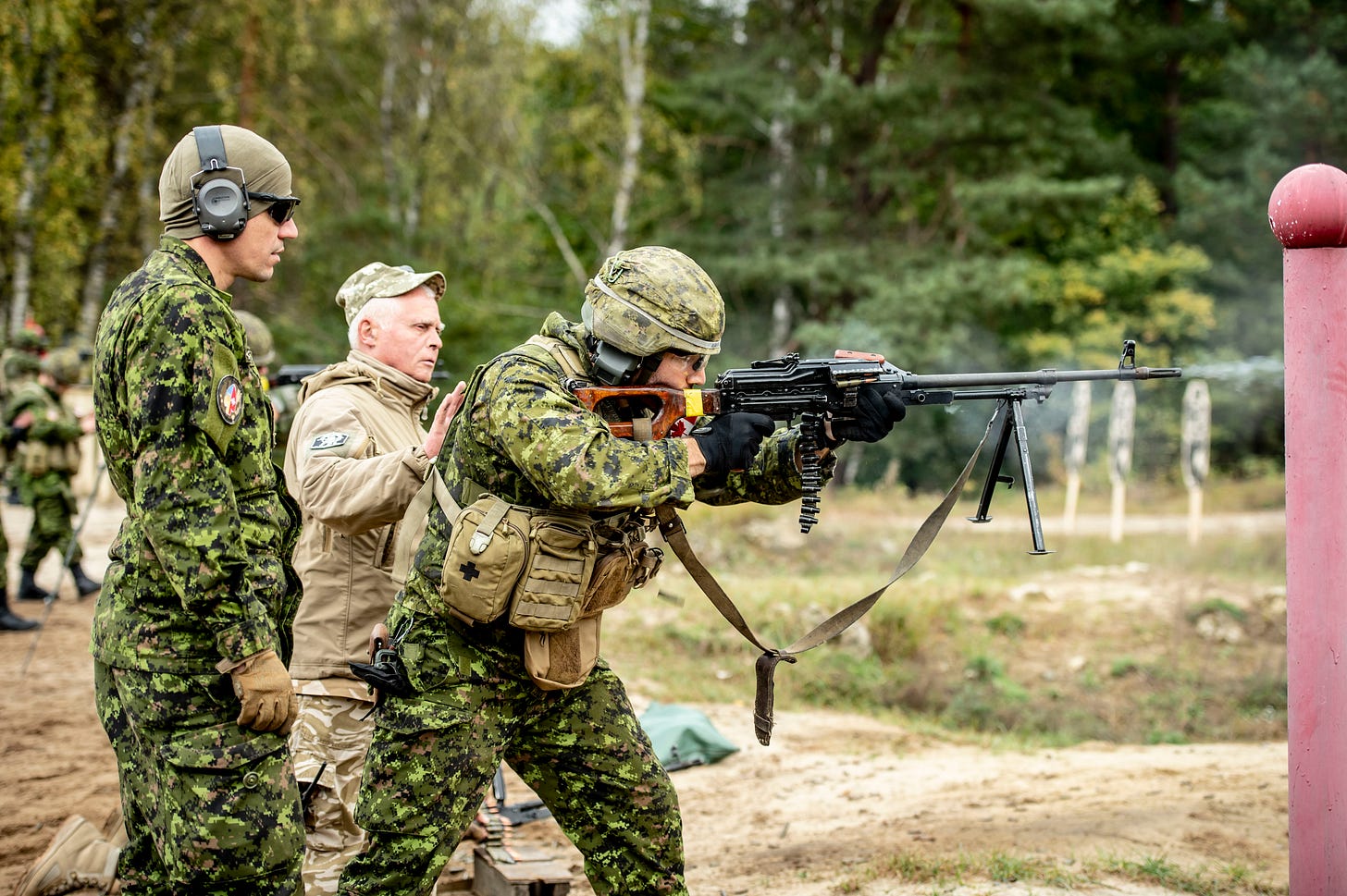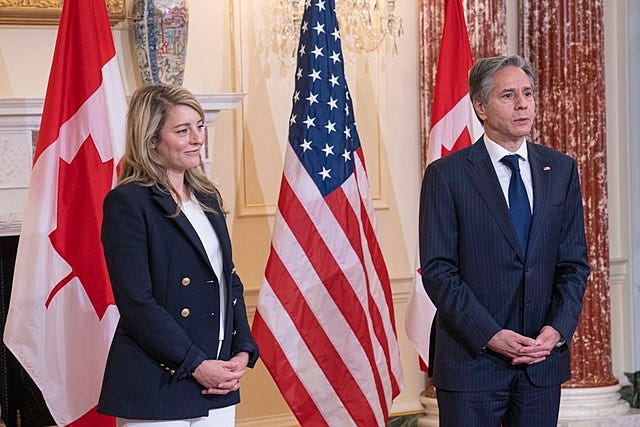Canadian media lusts for war
News outlets have given uncritical coverage to spy agencies' claims on Ukraine

Russia, Russia, Russia.
If you’ve been paying attention to the Canadian media in recent days, that’s likely the majority of what you’ve been hearing.
Russian President Vladimir Putin, you may have heard, has amassed 100,000 troops on the border with Ukraine, a country within which there is a significant Russian minority. We’re told that, as a NATO member, Canada must step up military assistance or suffer consequences, ignoring what exactly we’re doing in Ukraine and its consequences.
That Canada must participate in NATO’s hostile encirclement of Russia is taken as a foregone conclusion.
Coverage of a recent bulletin from the Canadian Centre for Cyber Security, an arm of Canada’s major spy agency, the Communications Security Establishment, provides a useful case study in how media manufactures consent for escalating conflict.
The release, which was accompanied by similar bulletins from U.S. and U.K. spy agencies, tells operators of critical digital infrastructure that they should be very afraid of Russian cyberattacks after Ukraine claimed it was hit by one.
The advisory was regurgitated verbatim by CTV News and Reuters, while the Globe and Mail’s story included quotes from Minister of Global Affairs Mélanie Joly — who threatened “severe consequences” for Russia — and Carleton University political scientist Stephanie Carvin.
The Globe reported that Carvin warned Canada would be targeted because it “is among the most outspoken countries championing Ukraine’s right to independence and freedom from Russian interference.”
“I don’t think Canadians appreciate that what happens in Ukraine could happen here,” Carvin told the Globe.
The National Post rewrote the release and included comment from David Masson with cyber-AI defence company Darktrace, which sells software to protect against potential cyberattacks, who said the mere fact that three governments put out this bulletin shows it’s serious.
A Canadian Press piece, which appeared in news outlets across the country, did feature criticism of Canada’s foreign policy by quoting three sources who thought Joly wasn’t being antagonistic enough towards Russia — Orest Steciw, executive director of the League of Ukrainian Canadians, Ihor Michalchyshyn, executive director of the Ukrainian Canadian Congress, and Conservative MP James Bezan.
The question of whether Russia is actually engaging in cyber espionage against Canada, to what extent, and if so whether Canada taking a more cautious approach might ameliorate the threat, is, for the most part, left unasked.
A CBC News article headlined, “As invasion threat looms, Ukraine asks for weapons — and Canada makes evacuation plans,” which quoted Joly, Michalchyshyn, Lt.-Col. Luc-Frederic Gilbert and retired Canadian representative to NATO Bob Davidson, attempted balance via a single paragraph referencing a statement from the Canadian Foreign Policy Institute and other peace groups that acknowledged "Canada's role in fomenting the dangerous, escalating conflict in Ukraine."
To its credit, the Toronto Star quoted a Canadian Centre for Cyber Security spokesperson, who admitted it is “very unlikely … that cyber threat actors will intentionally seek to disrupt Canadian critical infrastructure and cause major damage or loss of life in the absence of international hostilities.”

Meanwhile, David Pugliese of the Ottawa Citizen reported a couple weeks ago that Canada is planning on building an ammunition factory in Ukraine — for peaceful purposes, I’m sure.
Pugliese has been one of the only mainstream Canadian reporters asking difficult questions about the role Canada’s been playing in Ukraine, where 200 Canadian troops are stationed as part of the Operation UNIFIER training mission.
He revealed in October that Ukrainian far-right extremists associated with the Azov movement, which has a battalion in the Ukrainian military, have been bragging about support they’ve received from NATO countries, including Canada, on online forums, where they were also praising Nazi war criminals, doing Nazi salutes and promoting white nationalism. This story was picked up two weeks later by CTV News, but seems to have been quickly forgotten.
In November, Pugliese reported that Canadian officials met with members of Azov in 2018, but were mainly concerned with word of it getting out to the media.
With the onslaught of articles demanding to know what Prime Minister Justin Trudeau will do about Ukraine, these inconvenient realities about the nature of our mission in Ukraine have been swept aside in favour of unmitigated jingoism.
This media drumbeat for war is, of course, not a new phenomenon.
As Davide Mastracci wrote in Passage last year, the editorial boards at Canadian newspapers have been near-unanimous in supporting war.
Mastracci looked at editorials written in the Globe and Mail, Toronto Star, Montreal Gazette, Ottawa Citizen, Vancouver Sun and National Post on 12 major armed conflicts:
The First World War
The Second World War
Korea
The First Gulf War
Somalia
Bosnia
Kosovo
Afghanistan
Iraq
Haiti
Libya
ISIL
The Star was the only paper to express opposition to any of these wars, but in only two cases — the 2003 invasion of Iraq and the war against ISIL.
If the Canadian government decides to engage in a major escalation in Ukraine, the media will have played a major role in laying the groundwork for it.
In other news …
Federal government agrees to hand over residential school docs
Crown-Indigenous Relations Minister Marc Miller said the feds will hand over 875,000 residential school records to the National Centre for Truth and Reconciliation.
From CBC News: Among the records not yet released are what's known as school narratives — reports compiled by Ottawa outlining an individual institution's history, including its administration, the number of Indigenous children forced to attend it and key events, such as reports of abuse.
"To me as a survivor we have to acknowledge our shared history, where we've come from, where we're at today and where is it we're going to go into the future," said residential school survivor Garnet Angeconeb. "This is very important in that the records that will be handed over will be a way to get at the truth, to be able to tell our stories, to be able to validate and acknowledge where we have come from as survivors."
Edited by Scott Schmidt




Do you think that Russia is justified in invading Ukraine?